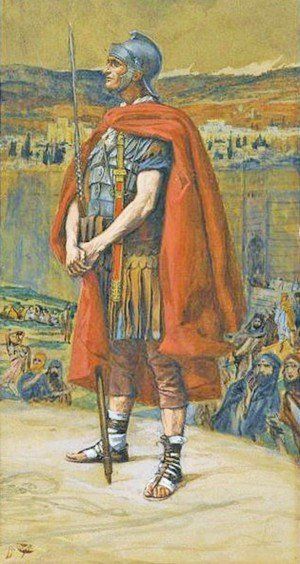Joseph of Arimathea
Did Joseph of Arimathea ever visit Britain? An ancient tradition suggests that he might have done. It says that Joseph of Arimathea was the first evangelist to the British Isles. The story goes like this.
Joseph was a merchant by trade, specialising in metal. In the first century tin and lead mining were thriving industries in the English West Country. Joseph used to conduct business by sea with the Cornish miners.
After Pentecost, Joseph gave up this work. He joined a team of missionaries led by the apostle Philip. They came to western Europe. Having reached Gaul (now France) they split into two groups.
One group stayed in the vicinity of Marseilles. The other, which included Joseph, travelled north. Because of his familiarity with Britain, Joseph was chosen by Philip to cross the channel and bring the gospel to these shores.
With 11 or 12 associates he sailed along the north shore of Cornwall and Devon and landed on the Somerset coast. At Glastonbury Joseph established the first missionary base in the British Isles.
Written history
It could be that this story was invented to boost Glastonbury’s later claim to fame as a centre of superstition. But there is one reason why I think it is true.
The first Briton to write a history of these islands was called Gildas. He lived at the beginning of the sixth century. He tells us that Christianity first came to Britain ‘at the latter part of the reign of Tiberius Caesar’.

Tiberius was Roman Emperor from A.D. 14-37. Gildas could have made a mistake, but if he is right, it means the gospel first reached our shores a mere 5 or 6 years after the crucifixion and resurrection of Jesus Christ.
We can’t be sure, but the possibility that Joseph came to Britain with a small band of followers and planted a church at Glastonbury should not be ruled out.
Aristobulus
In the middle of the second century there was a Christian writer at Rome called Hippolytus. Attached to his works is a list of names. It claims to identify the seventy whom Jesus sent out in Luke 10. Included in the list we find Aristobulus, mentioned by Paul in Romans 16:10.
Whether Aristobulus really was one of that group, we cannot say for sure. But the list adds some information about the men. Of Aristobulus it says that he became a pastor in Britain.
Again, we cannot prove that this information is correct, but it is not impossible. It is quite likely that the British congregations would have looked to churches in mainland Europe, such as Rome, to supply them with pastors in those earliest times. Traditions have to come from somewhere!
Bede
I am not suggesting we should accept every ancient tradition without exercising discernment. For example, there is another old story about Joseph of Arimathea which claims that he brought the Lord Jesus himself to England while he was a boy! Clearly, this is nothing but a legend, which has been rightly described as ‘absurd’.
In the year 731, a monk from Jarrow in South Tyneside (named Bede), wrote a book entitled A History of the English Church and People.
He gives quite a different account of the origin of the Christian faith in Britain. He claims that during the final quarter of the second century a British king called Lucius wrote to Eleutherus, Bishop of Rome, ‘asking to be made a Christian by his direction’.
Bede believed that Christianity first came to this country when Eleutherus responded positively to this request.

Again, we have to say that the story is not impossible. Rome was then the imperial capital city and the centre of the Empire’s life, and people would send to Rome for all sorts of things.
It would be perfectly natural for a king who wanted to learn about the Christian faith to contact Rome. However, even if Lucius did make this approach, it does not mean there was no Christianity in Britain before that. Bede was probably mistaken as far as that is concerned.
Claims
There are other medieval traditions which suggest that King Lucius was responsible, not so much for the origin of Christianity in Britain, as for its revival when it was at a low ebb. According to this version of the story, what Lucius asked was for missionaries to be sent to Britain to help restore a languishing church.
Against both versions of the Lucius story, it does have to be said that later writers were often motivated by a desire to bolster the claims of the Roman Catholic Church. Bede was no exception in this, and this could explain why he passed on the story that Lucius had contact with Rome. It may actually be fictional.
It is true that Foxe, the famous author of The Book of Martyrs, called Lucius ‘the first Christian king’. Even if Christianity was present in Britain before the time of Lucius, Foxe could be right to describe him in this way.
Lucius may indeed have been the first British monarch to be converted, even if he was not the man responsible for bringing the gospel to these shores.
Shrouded in mystery
On the other hand, it has been suggested that Bede may have confused two different men, both called Lucius, and that later writers repeated his mistake. Apparently, as well as Lucius King of Britain there was, about the same time, another Lucius who was king of Edessa (now known as Urfa, in southern Turkey).

This Lucius had a citadel which, in his own language, was referred to as a Britium. It would have been easy for this word to be mistaken for a reference to Britain.
What must be clear by now is that the origin of Christianity in these islands is shrouded in mystery! We cannot be sure how, in the good providence of God, the gospel first came to our country.
We seem to be on firmer ground when we turn to the writings of Tertullian. About A.D. 200 he wrote a work entitled Against the Jews. Part of his purpose was to demonstrate that Jesus is indeed the Messiah of Jewish hope.
In the course of his argument he makes the point that the Britons were ‘inaccessible to the Romans, but subjugated to Christ’.
Roman Britain
Now, the Romans succeeded in conquering only the southern half of Britain. Initially, imperial influence stretched as far north as the rivers Clyde and Forth, but early in the second century Rome retreated.
Hadrian’s wall was begun in A.D. 122 and became the northern frontier of the Empire, intended to keep out the ‘barbarians’. We may assume that by the end of the second century Tertullian was aware that Christianity had penetrated further north than that, and perhaps further north than the Clyde-Forth line.
In addition to written comments like Tertullian’s, it is possible to trace the spread of Christianity through archaeology. Archaeological digs have discovered that throughout the first and second centuries A.D. cremation (followed by interment of the ashes in urns) was very much the norm in Britain.
However, by the third and fourth centuries, burials were becoming increasingly common. Cremation, the pagan form of funeral, was rejected by the early Christians in favour of burial.

This was the biblical method. It gave practical expression to the hope of the resurrection of the body. This finding shows that Christianity was certainly making headway in Britain soon after the year 200.
Martyrs
Gildas also tells us that a number of martyrdoms took place in Britain during the reign of the Roman Emperor Diocletian. He reigned at the end of the third and the beginning of the fourth century.
Gildas mentions three martyrs by name. The first two, Aaron and Julius, came from ‘the City of Legions’. We do not know now where Gildas meant by this. Various suggestions have been made, including Caerleon, Carlisle, and York, but they are only guesses.
The third martyr was a man called Alban who died in Verulamium, now called St Albans in his memory.
Gildas could be mistaken about the date, although he is followed by Foxe, who dates Alban’s martyrdom precisely to 22 June 287.
Most of the contemporary evidence suggests that the persecution under Diocletian did not amount to much in Britain due to the presence here of an assistant emperor named Constantius, who was unusually mild mannered for a Roman politician.
Thus some historians think that these martyrdoms should be dated a century earlier, during a previous persecution. This is probably correct.




